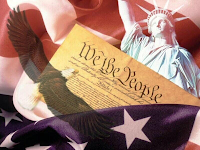
by Rob Catlett
Springfield, MO
“I think when you spread the wealth around, it's good for everybody." Barack Obama, October 16, 2008
"I cannot undertake to lay my finger on that article of the Constitution which granted a right to Congress of expending, on objects of benevolence, the money of their constituents." James Madison, Father of the US Constitution, 1794
The two quotes are from statesmen at diametrically opposite ends of American history and political philosophy. The core issue here is the role of government to provide for the common good. Should government redistribute resources to reduce inequalities in wealth distribution, or should free markets be the arbiter of value? When one looks at the history of the world, what economic and political system has best moved man from grinding poverty to improved health care, medicine, security, and leisure activities?
I say unequivocally that the existence of free markets has led to the greatest explosion of wealth the world has ever seen. Free markets are characterized by several key factors: voluntary win-win exchanges, personal property rights, and equal protection under the rule of law. Looking at countries around the world, there is a direct relationship between these factors and the prosperity of the country. Venezuela, Zimbabwe, and Russia all confiscate personal property on a whim, control free speech, plan their economies, and as a result their standard of living suffers. Ireland and New Zealand are at the other end of the spectrum and benefit from their open societies.
Think of all of the parts that make up your computer, certainly there are thousands. Consider all of the companies involved, the various countries, diverse religions and ethnicities of the workers, and yet somehow a shiny computer sits on your desk, performing the tasks that you need. No government dictated that the computer be built, designed a chip, or did market research. It was an incredible amount of voluntary, win-win exchanges among thousands that brought this computer to your desk. An outcome of those many transactions was the creation of personal wealth by those who exchanged their time and energy for money. Their profits are then used at their discretion to purchase food, health care, savings, iPhones, or whatever suits them best. For these voluntary exchanges to take place, one must have control of private property.
Let us contrast win-win exchanges against the government sponsored programs for the common good. The corn farmer and ethanol producer are content to receive their subsidy; however that confers an obligation upon all other citizens to pay extra for their food and gasoline. This is a win-lose exchange for the citizens. Individually, the subsidy may not be onerous, but the list of obligations subjected upon citizens by our government is almost never ending. The taking of private property and giving it to others is a trait minimized in flourishing nations, and promoted in areas that continue to struggle.
Historically, wealth was amassed by invading, plundering, stealing and enslaving. Over the past two centuries, we have witnessed the explosion and broadening of wealth with governments having a critical role. The critical role however is to protect private property, and making clear the rule of law that protects all, and to minimize wealth transfers. Capitalism, with all of its warts and imperfections, still provides the best way to provide for the common good. To surrender free speech and property rights to the government for bureaucrats to decide how best to serve the common good goes against the lessons of history, and certainly does not align with the vision James Madison had for our country.

.bmp)





No comments:
Post a Comment